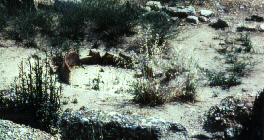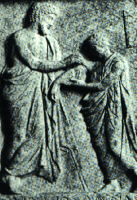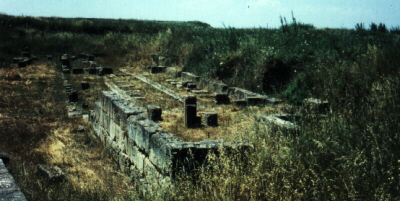 |
|||||||
| Phaedo | |||||||
The Death Scene115b-118a |
||
115b |
When he had done speaking, Crito said: And have you any | Jowett's Notes |
| commands for us, Socrates--anything to say about your | ||
| children, or any other matter in which we can serve you? | ||
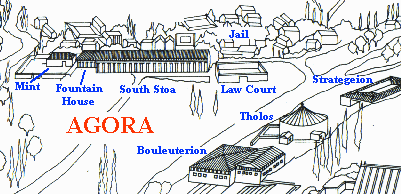 The setting is the Jail in the Agora
|
||
| Nothing particular, he said: only, as I have always told you, | ||
| I would have you look to yourselves; that is a service which | ||
| you may always be doing to me and mine as well as to | ||
| yourselves. And you need not make professions; for if you | ||
| take no thought for yourselves, and walk not according to the | ||
| precepts which I have given you, not now for the first time, | ||
115c |
the warmth of your professions will be of no avail. | |
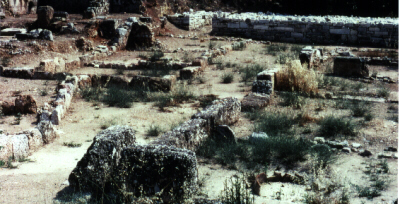 Ruins of the Jail
|
||
| We will do our best, said Crito. But in what way would you | ||
| have us bury you? | ||
| In any way that you like; only you must get hold of me, and | ||
| take care that I do not walk away from you. Then he | ||
| turned to us, and added with a smile: I cannot make Crito | ||
| believe that I am the same Socrates who have been talking | ||
| and conducting the argument; he fancies that I am the other | ||
| Socrates whom he will soon see, a dead body--and he asks, | ||
115d |
How shall he bury me? And though I have spoken many | |
| words in the endeavor to show that when I have drunk the | ||
| poison I shall leave you and go to the joys of the blessed -- | ||
| these words of mine, with which I comforted you and myself, | ||
| have had, I perceive, no effect upon Crito. And therefore I | ||
| want you to be surety for me now, as he was surety for me | ||
| at the trial: but let the promise be of another sort; for he | ||
| was my surety to the judges that I would remain, but you | ||
| must be my surety to him that I shall not remain, but go away | ||
115e |
and depart; and then he will suffer less at my death, and not | |
| Thus we lay out Socrates, or, Thus we follow him to the | ||
| grave or bury him; for false words are not only evil in | ||
| themselves, but they infect the soul with evil. Be of good | ||
| cheer, then, my dear Crito, and say that you are burying | ||
| my body only, and do with that as is usual, and as you | ||
116a |
think best. | |
| When he had spoken these words, he arose and went into | ||
| the bath chamber with Crito, who bade us wait; and we | ||
| waited, talking and thinking of the subject of discourse, | ||
| and also of the greatness of our sorrow; he was like a father | ||
| of whom we were being bereaved, and we were about to | ||
| pass the rest of our lives as orphans. When he had taken | ||
|
||
116b |
the bath his children were brought to him--(he had two young | He takes leave of |
| sons and an elder one); and the women of his family also | his family. | |
| came, and he talked to them and gave them a few directions | ||
| in the presence of Crito; and he then dismissed them and | ||
| returned to us. | ||
| Now the hour of sunset was near, for a good deal of time | ||
| had passed while he was within. When he came out, he | ||
| sat down with us again after his bath, but not much was said. | ||
| Soon the jailer, who was the servant of the Eleven, entered | The humanity of the | |
116c |
and stood by him, saying: To you, Socrates, whom I know | jailer. |
| to be the noblest and gentlest and best of all who ever | ||
| came to this place, I will not impute the angry feelings of | ||
| other men, who rage and swear at me when, in obedience to | ||
| the authorities, I bid them drink the poison--indeed, I am | ||
| sure that you will not be angry with me; for others, as you | ||
| are aware, and not I, are the guilty cause. And so fare you | ||
| well, and try to bear lightly what must needs be; you know | ||
116d |
my errand. Then bursting into tears he turned away and | |
| went out. | ||
| Socrates looked at him and said: I return your good wishes, | ||
| and will do as you bid. Then, turning to us, he said, How | ||
| charming the man is: since I have been in prison he has always | ||
| been coming to see me, and at times he would talk to me, | ||
| and was as good to me as could be, and now see how | ||
| generously he sorrows for me. But we must do as he says, | ||
| Crito; let the cup be brought, if the poison is prepared: if | ||
| not, let the attendant prepare some. | ||
116e |
Yet, said Crito, the sun is still upon the hilltops, and many | Crito would detain |
| a one has taken the draught late, and after the announcement | Socrates a little | |
| has been made to him, he has eaten and drunk, and indulged | while. | |
| in sensual delights; do not hasten then, there is still time. | ||
| Socrates said: Yes, Crito, and they of whom you speak are | ||
| right in doing thus, for they think that they will gain by the | Socrates thinks that | |
| delay; but I am right in not doing thus, for I do not think that | there is nothing to be | |
117a |
I should gain anything by drinking the poison a little later; | gained by delay. |
| I should be sparing and saving a life which is already gone: I | ||
| could only laugh at myself for this. Please then to do as I | ||
| say, and not to refuse me. | ||
| Crito, when he heard this, made a sign to the servant, and the | ||
| servant went in, and remained for some time, and then | ||
| returned with the jailer carrying a cup of poison. Socrates | ||
| said: You, my good friend, who are experienced in these | ||
| matters, shall give me directions how I am to proceed. The | ||
|
||
117b |
man answered: You have only to walk about until your legs | |
| are heavy, and then to lie down, and the poison will act. At | ||
| the same time he handed the cup to Socrates, who in the | ||
| easiest and gentlest manner, without the least fear or change | ||
| of color or feature, looking at the man with all his eyes, | ||
| Echecrates, as his manner was, took the cup and said: What | ||
| do you say about making a libation out of this cup to any | ||
| god? May I, or not? The man answered: We only prepare, | ||
| Socrates, just so much as we deem enough. I understand, | ||
| he said: yet I may and must pray to the gods to prosper my | ||
| journey from this to that other world--may this, then, which | ||
| is my prayer, be granted to me. Then holding the cup to his | ||
| lips, quite readily and cheerfully he drank off the poison. | ||
| And hitherto most of us had been able to control our sorrow; | ||
| but now when we saw him drinking, and saw too that he | ||
| had finished the draught, we could no longer forbear, and | ||
| in spite of myself my own tears were flowing fast; so that | ||
| I covered my face and wept over myself, for certainly I was | ||
116d |
not weeping over him, but at the thought of my own calamity | |
| in having lost such a companion. Nor was I the first, for | ||
| Crito, when he found himself unable to restrain his tears, had | ||
| got up and moved away, and I followed; and at that moment. | ||
| Apollodorus, who had been weeping all the time, broke out | ||
| a loud cry which made cowards of us all. Socrates alone | ||
117e |
in retained his calmness: What is this strange outcry? he said. | |
| I sent away the women mainly in order that they might not | ||
| offend in this way, for I have heard that a man should die | ||
| in peace. Be quiet, then, and have patience. | ||
| When we heard that, we were ashamed, and refrained our | ||
| tears; and he walked about until, as he said, his legs began to | ||
| fail, and then he lay on his back, according to the directions, | ||
| and the man who gave him the poison now and then looked | ||
| at his feet and legs; and after a while he pressed his foot | ||
118a |
hard and asked him if he could feel; and he said, no; and then | |
| his leg, and so upwards and upwards, and showed us that he | ||
| was cold and stiff. And he felt them himself, and said: When | ||
| the poison reaches the heart, that will be the end. He was | ||
| beginning to grow cold about the groin, when he uncovered | ||
| his face, for he had covered himself up, and said (they were | ||
| his last words)--he said: Crito, I owe a cock to Asclepius; | ||
| will you remember to pay the debt? The debt shall be paid, | ||
|
||
| said Crito; is there anything else? There was no answer to | ||
| this question; but in a minute or two a movement was heard, | ||
| and the attendants uncovered him; his eyes were set, and | ||
| Crito closed his eyes and mouth. | ||
| Such was the end, Echecrates, of our friend, whom I may | ||
| truly call the wisest, and justest, and best of all the men | ||
| whom I have ever known. | ||
|
||
